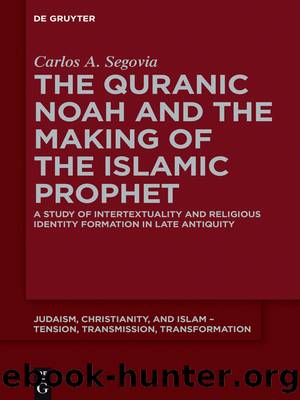The Quranic Noah and the Making of the Islamic Prophet by Carlos A. Segovia

Author:Carlos A. Segovia
Language: deu
Format: epub
Publisher: de Gruyter
Published: 2015-01-15T00:00:00+00:00
Excursus. A Syriac source behind the blessing of Noah in Q 37:78â81?
In his widely discussed essay on what he calls the Syro-Aramaic background to the language of the QurâÄn,47 Christoph Luxenberg (2007: 157â60) proposes to identify a Syriacism in the quranic pericope on the blessing of Noah contained in SÅ«rat aá¹£-á¹¢ÄffÄt (Q 37), more precisely in the final word of its second verse (Q 37:79); accordingly, he offers a new, challenging interpretation of vv. 78â80, which constitute but the first three segments of a four- or (if vv. 73â4 and 127â8 are also counted in it, on which see below) six-segment refrain repeatedly if not homogeneously displayed in vv. 78â81 (regarding Noah), 105 and 108â11 (Abraham),119â22 (Moses and Aaron), and 129â32 (Elijah).
In what follows I will review Luxenburgâs philological argument, which clearly needs to be nuanced.48 Nonetheless, I will try to substantiate his overall hermeneutical argument by further examining the whole refrain and the verses preceding it, especially vv. 73â4 (and, more broadly, vv. 11â74). One thing of which Luxenberg seems unaware is that the association of Noah with the eschaton is rather fundamental in the QurâÄn â and recurrent for that matter â an additional argument that could back up his interpretation of vv. 78â80. But before reassessing Luxenbergâs reading, let us first take a closer look at the text:
Q 37:78:
Download
This site does not store any files on its server. We only index and link to content provided by other sites. Please contact the content providers to delete copyright contents if any and email us, we'll remove relevant links or contents immediately.
| Africa | Americas |
| Arctic & Antarctica | Asia |
| Australia & Oceania | Europe |
| Middle East | Russia |
| United States | World |
| Ancient Civilizations | Military |
| Historical Study & Educational Resources |
Cecilia; Or, Memoirs of an Heiress — Volume 1 by Fanny Burney(32548)
Cecilia; Or, Memoirs of an Heiress — Volume 2 by Fanny Burney(31947)
Cecilia; Or, Memoirs of an Heiress — Volume 3 by Fanny Burney(31932)
The Secret History by Donna Tartt(19053)
Sapiens: A Brief History of Humankind by Yuval Noah Harari(14370)
Leonardo da Vinci by Walter Isaacson(13318)
The Radium Girls by Kate Moore(12018)
Sapiens by Yuval Noah Harari(5366)
How Democracies Die by Steven Levitsky & Daniel Ziblatt(5216)
The Wind in My Hair by Masih Alinejad(5092)
Homo Deus: A Brief History of Tomorrow by Yuval Noah Harari(4908)
Endurance: Shackleton's Incredible Voyage by Alfred Lansing(4769)
Man's Search for Meaning by Viktor Frankl(4585)
The Silk Roads by Peter Frankopan(4526)
Millionaire: The Philanderer, Gambler, and Duelist Who Invented Modern Finance by Janet Gleeson(4469)
The Rape of Nanking by Iris Chang(4203)
Joan of Arc by Mary Gordon(4101)
The Motorcycle Diaries by Ernesto Che Guevara(4089)
Stalin by Stephen Kotkin(3957)
